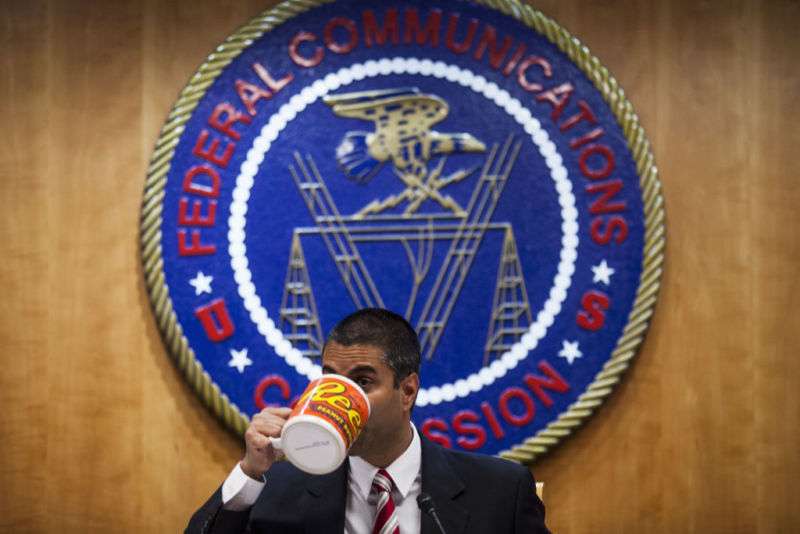
Ajit Pai oks T-Mobile/Sprint merger, “requires” 5G rollout that’ll happen anyway

T-Mobile and Sprint are one big step closer to getting the US government’s approval to merge, as Federal Communications Commission Chairman Ajit Pai today announced his support for the deal combining two of the four largest US mobile carriers.
Pai’s announcement virtually guarantees that the FCC will approve the deal; FCC approval would be finalized after the Republican-controlled commission votes. But T-Mobile and Sprint still need to convince the Department of Justice, which hasn’t yet said whether it will sue to block the merger on antitrust grounds.
Pai’s statement on the merger said he’s approving it in large part because T-Mobile and Sprint “committed to deploying a 5G network that would cover 97 percent of our nation’s population within three years of the closing of the merger and 99 percent of Americans within six years.” They also committed to deploying 5G to 85 percent of rural Americans within three years and 90 percent within six years.
But as we wrote more than a year ago, T-Mobile and Sprint each said it would build a nationwide 5G network on its own before they agreed to merge. The companies made deploying 5G their key promise in the merger, even though all four major carriers were going to do that anyway.
T-Mobile and Sprint also promised the FCC they won’t raise prices for three years, Pai said. Technically, the merged company could introduce new, more expensive plans as long as it keeps offering existing ones at the same prices. In its commitments to the FCC, the companies said they will “make available the same or better rate plans as those offered by T-Mobile or Sprint as of February 4, 2019 for three years following the merger.”
If the merged company fails to deliver on these and other enforceable commitments, it would “suffer serious consequences” including fines of billions of dollars, Pai said.
But consumer advocates said the conditions aren’t enough to offset the merger’s harms. “The supposed three-year price freeze is meaningless in a wireless market where prices are falling and likely would continue to drop in the absence of this merger,” advocacy group Free Press said today. “The little bit of price competition people have enjoyed thanks to the rivalry between Sprint and T-Mobile could keep sending prices lower. So a meaningless and unenforceable promise to just tread water where we are now is a sad joke, and nothing more.”
T-Mobile and Sprint also “offered specific commitments regarding the rollout of an in-home broadband product, including to rural households,” Pai said. As we’ve previously reported, T-Mobile already began deploying its wireless home Internet service without Sprint.
“The T-Mobile-Sprint merger is still anti-competitive and anti-consumer,” said Gigi Sohn, a former FCC official who was counselor to then-Chairman Tom Wheeler during the Obama administration. “The companies have made a handful of promises on 5G, rural buildout and in-home broadband that are speculative, not specific to the merger and completely unenforceable. Does anyone really believe that this FCC, which has asked nothing of the big mobile companies for over two years, will require the companies to abide by these commitments?”
The Justice Department is “leaning against” approving the merger because the proposed conditions “don’t go far enough to resolve antitrust concerns,” Bloomberg reported today, citing an anonymous source.
Prepaid subsidiary Boost will be divested
The merger would reduce competition by lowering the number of nationwide wireless carriers from four to three. But the FCC told reporters in a press call today that competition concerns were allayed by the companies’ commitments not to raise prices for three years and to divest Boost Mobile, Sprint’s prepaid wireless subsidiary that provides service to many low-income customers.
Boost is a reseller, so it will have to rely on access to the merged company’s network, whereas currently it resells Sprint service. Under the merging companies’ deal with the FCC, the commission will be able to approve or deny a new wholesale agreement T-Mobile is expected to strike with Boost.
“This sale is designed to address potential competitive issues that have been identified in the prepaid wireless segment,” Pai said.
After the merger, T-Mobile would still own its prepaid subsidiary Metro (formerly MetroPCS) and add Sprint’s Virgin Mobile to its list of properties.
5G limitations
While the upgrade from 4G to 5G will bring speed improvements, T-Mobile recently said the biggest speed increases will only come to “small pockets of 5G hotspots in dense urban environments.” That’s because 5G’s biggest speed gains rely on high-frequency spectrum in which transmissions don’t travel far and are easily blocked by buildings and other obstacles.
The speed gains from deploying 5G on the low- and mid-band spectrum used for 4G will be minor in comparison. But according to Pai, “T-Mobile and Sprint have guaranteed that 90 percent of Americans would have access to mobile broadband service at speeds of at least 100Mbps and 99 percent would have access to speeds of at least 50Mbps.”
T-Mobile already provides average download speeds of 21.1Mbps, while Sprint’s network offers an average of 13.9Mbps, according to OpenSignal data based on customer speed tests nationwide.
T-Mobile and Sprint will have to deliver on the speed promise within six years, FCC officials told reporters. The speed gains will come largely from mid-band spectrum.
“T-Mobile and Sprint have promised that their network would cover at least two-thirds of our nation’s rural population with high-speed, mid-band 5G,” Pai said.
FCC Democrat warns of merger harms
While the FCC’s Democrats may vote against the merger approval, Pai’s order would be finalized with yes votes from Republican commissioners Brendan Carr and Michael O’Rielly. Carr today said he’s supporting the merger, writing on Twitter that the deal “will enable Americans across the country to see more competition and an accelerated buildout of fast, 5G service, including in rural America.”
FCC Democrat Jessica Rosenworcel disagreed. “We’ve seen this kind of consolidation in airlines and with drug companies. It hasn’t worked out well for consumers,” she wrote on Twitter. “But now the FCC wants to bless the same kind of consolidation for wireless carriers. I have serious doubts.”
We asked O’Rielly’s office about his plans for the T-Mobile/Sprint merger, and will update this article if we get a response.
The merger has been criticized by consumer advocacy groups, Democratic members of Congress, and rural carriers who say industry consolidation will drive up prices for roaming.
“If allowed to proceed, this transaction would consolidate the nation’s wireless market from four to just three carriers, lead to price increases for virtually all wireless customers, substantially raise wholesale rates for smaller wireless carriers, and cause significant job losses—all while failing to deliver the promised benefits of accelerated 5G deployment or expanded rural coverage,” consumer advocacy group Public Knowledge told the DOJ and FCC in an open letter last month. “The parties have had more than 11 months to make a convincing argument that their deal is in the public interest and that it will not harm competition. To date, they have failed to make this case.”




